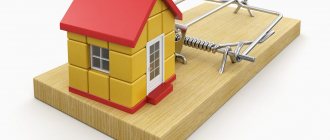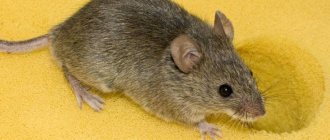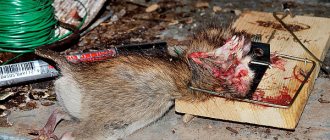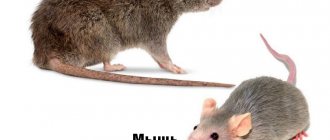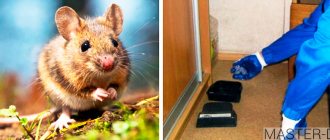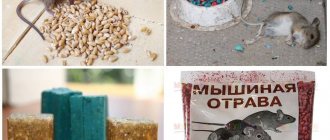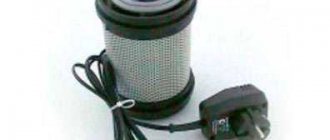Reasons for the appearance of mice in the apartment
With the onset of cold weather, mice settle in country houses and can enter city apartments. They do not manage to take root everywhere: if you have a cat, cleaning is done regularly, food is put away - the animals will have a hard time. For a comfortable life, rodents need:
- Dirt and disorder. If people in the apartment eat not only in the kitchen and do not remove crumbs and leftover food, rodents will easily find food.
- Cluttered space. When the room is littered with boxes, furniture and things, mice make nests and move freely, because at any moment you can find shelter under a box or cabinet. When the population grows, some of the rodents leave to look for a new home in a neighboring apartment.
Mice can get into an apartment by accident - they arrive along with new furniture or household appliances, which means that no one is safe from the appearance of mice.
Favorite habitats of mice
In an apartment, mice choose secluded corners and build nests there. They prefer to live:
- behind a suspended ceiling;
- in lockers on the balcony;
- behind plasterboard sheathing;
- under the bath;
- on mezzanines;
- in upholstery of sofas and upholstered furniture.
How to get rid of rodents easily, conveniently and without problems?
In professional language, getting rid of rodents is called DERATISATION.
The fact is that professionals will not just come to your house, treat it with an unknown gas and leave.
Professionals work in several stages:
Firstly, professional pest control agents will come to your home confidentially and your neighbors will not approach you with any complaints.
Professional exterminators will determine the cause of the mice.
Then this reason will be eliminated first.
This could be for various reasons:
- Grocery warehouse located nearby
- Unclean neighbors
- Grocery store. That is, the place where the population of mice has grown so much that they began to look for new nesting places.
Then professionals will carry out high-quality treatment of the premises. Accordingly, preparations and treatment agents are selected based on the reason, number and location of the room being treated.
In addition, after professional processing, you will receive all the necessary documents for the SES.
Plus, you will receive a guarantee that rodents will not return to your home or business.
CALL RIGHT NOW +7(929)602-77-93
Why are mice dangerous?
Rodents spoil food supplies - they eat and stain cereals, flour and sugar with their feces. They make nests in sofas and upholstered furniture, chew through wiring and plastic pipes, and chew holes in walls and decorative panels. The design of their body allows the animal to crawl into the smallest hole and breed there.
Mice carry infections that are dangerous to humans:
- pseudotuberculosis;
- vesicular rickettsiosis;
- leptospirosis;
- tularemia;
- plague
Some infections are transmitted through mouse feces, others through fleas, which can pass from mice to humans.
Methods of transmission of diseases from mice
There are several possible ways of contracting infectious diseases from rodents. The vast majority of them occur after contact with the mouse itself or the results of its vital activity.
Access to food
Transfer methods:
- bites and scratches received from rodents;
- insect bites that parasitize mice;
- eating foods chewed by mice or contaminated with their excrement;
- contact of mouse feces on mucous membranes or open wounds;
- direct contact with the corpse of a rodent;
- by inhaling dust containing mouse hair and droppings.
Pet owners who actively hunt rodents who are wondering whether it is possible to catch mouse fever or another disease from a cat can be reassured that fever cannot be passed on to humans from a pet. But diseases transmitted, for example, by a flea bite, can pass to a cat, and from it to a person (and often with the insect itself).
Basic means and methods of control: how to get rid of house mice?
The centuries-old history of rodent control offers different ways to solve this problem. Modern, more effective and humane ones have been added to them.
Good old mousetraps
A mechanical mousetrap with bait is a traditional way of catching mice. The downside is that the mousetrap must be checked regularly in order to change the bait and not miss the moment when you can throw away the mouse corpse. A curious cat can seriously injure its paw if it tests the mousetrap.
Folk remedies
Mice don't like the smell of some plants. As an additional rodent control measure, you can hang bunches of dried plants around the house:
- black elderberry;
- chamomile;
- wormwood;
- peppermint;
- tansy;
- bay leaf.
Mice cannot tolerate the smell of bleach, ammonia and vinegar - they can be added to the water when carrying out wet cleaning. Boric acid is spilled near mouse holes and the animals have to leave them.
Rodents cannot tolerate loud noise. If you give them a sound attack for several days, they will leave. This method should not be used in a city apartment.
A poison is prepared for mice: sugar, flour and plaster are mixed. The diluted pulp clogs the intestines of rodents. Another treat option: a mixture of grain, flour and quicklime. It is important that children and pets do not have access to this mixture.
Homemade traps
You can make your own trap and, if it goes off, you will strike a blow to the mouse family. Not significant, but still.
"Under the Hood"
The bait is placed inside the pan. The rodent gets inside, but can no longer get out on its own.
Glue traps
Construction adhesive with bait is applied to a board or thick cardboard. You can purchase a ready-made trap with a special composition. The good thing about this method is that you don’t have to look for a poisoned mouse in the wall and suffer from an unpleasant odor. But such a device cannot be used if there are children and pets in the room.
Water trap
The bucket is 2/3 filled with water. A strip of cardboard with bait is attached to its edge. When the animal goes for the bait, the cardboard will bend under its weight and it will fall into the bucket.
Ultrasonic repellers
An electrical device emits ultrasound, inaudible to humans, but unbearable to rodents. To ensure that your country house is free of mice, it is recommended not to turn off the device for a whole month, with the exception of short breaks. Then turn it on prophylactically for 2-3 weeks. In addition to the rather high cost, some users note a deterioration in their mood while using the device.
Cats and dogs
The smell of a cat alone scares mice. If the cat is not lazy, he catches rodents, and the surviving individuals prefer to go home. Renting a cat is not always effective - the animal may experience stress when moving and refuse to hunt.
Many dog breeds also catch mice. The Miniature Schnauzer was bred to be a rat catcher and mouse catcher: the dog strangles rodents, but does not eat them.
When a cat or dog brings you prey - a strangled mouse, do not pick it up with your hands! The rodent can feign death, and when wounded, it becomes very aggressive and can bite a person.
If your goal is simply to get rid of mice and not to get a pet, then it is better to choose a different method of rodent control.
Professional deratization: removal of mice with a guarantee
If you are afraid of mice, do not want to pull their corpses out of traps and look for the decaying bodies of animals that have eaten poison behind the cladding and on the mezzanine, entrust the fight against rodents to professionals. Obviously, the pest control service costs more than a mousetrap, but you can forget about the problem.
When exterminating rodents, we use different methods of control:
- mechanical - installation of traps and mousetraps;
- chemical - gassing the premises with repellent pheromones and using drugs to regulate the rodent population;
- comprehensive – the most effective.
Professionals inspect the property and formulate a pest control plan depending on the scale of the problem. Specialists find and eliminate cracks and passages through which animals enter the apartment.
All drugs used are safe for human health. The action of each of them is designed for an average of 3 weeks. This means that once the mice are killed, they are guaranteed not to appear again for three weeks.
How to get them out
If you find small holes in the wall in your home, see chewed food, notice small mouse droppings on the floor, feel an unpleasant specific odor or hear rustling, start acting immediately. Mammals reproduce quickly; even one pair of rodents produces up to 60 offspring per year. There are several ways to permanently get rid of mice in an apartment, but before you use them, listen to the following tips:
- Place all food products in an inaccessible place: refrigerator or glass containers tightly closed with lids.
- The fight begins with purity. Clean regularly, pay special attention to the kitchen.
- After preparing food and eating, clean all surfaces of crumbs.
- Throw away trash promptly.
- Find mouse holes in the apartment and cement them or fill them with construction foam.
Folk remedies
There are many effective old-fashioned methods for driving out rodents. Check out some of them:
- Mousecatcher cat. Pets actively bark at rodents, and they are afraid of them, but one cat cannot cope with a large number of pests.
- Herbs. Knowing that mice do not like in the house, our ancestors used various herbs, such as mint and chamomile. Place plants in all nooks and crannies of the apartment where rodents may appear. Such plants have a special smell that small pests cannot tolerate.
- Ash. Protection proven over decades. Finely grind wood ash and pour it into any holes and crevices where rodents might crawl. The ash contains alkali, which corrodes the paws of rodents.
- Trap with a bottle. A great humane way to catch a mouse at home. Take any bottle (plastic, glass), pour a little sunflower oil on its bottom, set the trap at a slightly inclined angle, with the open neck facing up. A mouse caught in such a trap will slide along its walls, but will not get out on its own.
- Culinary method. Mix 200 g sugar, 500 g gypsum and 300 g flour in a bowl. Sprinkle the resulting mixture into saucers and place them around the apartment. After eating such bait, the rodent's intestines will become blocked.
Mousetraps
This is an inexpensive way to get rid of mice, but you shouldn’t put cheese instead of bait. This product is not as popular as a piece of lard, white bread, or sausage. A mousetrap has its pros and cons. Positive qualities include ease of use and compact size. This trap also has plenty of disadvantages. The mammal suffers before death, which is inhumane; only one animal at a time can be caught with bait.
If you don't want your mouse to disappear, read the instructions on how to make a safe mousetrap at home. Take a glass jar (0.5 or 1 liter) or glass, glue a piece of treat to the wall, closer to the bottom. Turn the container upside down, place one edge on the floor, and lift the other with a coin. When the rodent starts to get food, the structure will wobble and slam shut. The caught animal must be released away from residential buildings.
Ultrasonic rodent repeller
In our modern times, many technical devices have been invented that have a negative effect on indoor pests, for example, a repeller. This device emits ultrasonic waves that spread throughout the apartment, which only rodents can hear. The sound is so terrible for the animal that it provokes it to leave its habitat. Ultrasound is an effective way to drive rodents out of your apartment once and for all. Keep in mind that it has a negative effect on some pets (hamsters, rats, chinchillas, guinea pigs).
Poison
It is quite possible to get rid of mice using poisons in a short period of time. A large assortment of these substances against rodents is sold in markets and in specialized stores. Types of poison:
- suspensions;
- powdery;
- in liquid form;
- biscuits;
- paraffin briquettes.
The most popular drugs are the following:
- "Rat Death" These are bags containing poison inside.
- "Storm". These are blue wax briquettes containing a substance that is poisonous to mice.
- "Bactorodendicide." Looks like a cereal product treated with poisonous bacteria.
The bait is placed in the corners of the apartment and in those places where there are minks or animals often run through. If you have pets or small children living with you, it is not recommended to use pesticides. Your furry pets may mistakenly eat a toxic substance or spread it throughout the apartment with their paws. If possible, try to temporarily transfer your pets to another place.
- Buckwheat cutlets - step-by-step recipes with photos. How to cook buckwheat cutlets with minced meat and lean ones
- Zucchini in the microwave
- Maybelline foundation - types, price and reviews of use. How to use Maybelline foundation, video
Glue
When a rodent gets on sticky tape or cardboard with glue, it becomes tightly stuck and can no longer move. The positive qualities of Velcro is that several rodents can get caught in it at once. A sticky trap is not suitable for use if you have small children or pets living in your apartment, who can also stick to the mousetrap.
Disinfection
If you have the finances, you can shift the responsibility for getting rid of mice to professionals. They will perform two types of disinfection: preventive measures and extermination. The first type is carried out if small pests have not yet been noticed on the territory of the apartment, the second is aimed at the complete destruction of rodents using special toxic substances.
Preventing the appearance of mice in the apartment
To prevent mice from choosing your apartment, proceed as follows:
- Store cereals, sugar and flour in containers with tight-fitting lids. Mice definitely won’t chew through glass and metal containers;
- take out the trash every day;
- do not leave crumbs after meals and eat only at the dinner table;
- do not leave dirty dishes in the sink;
- check the tightness of the mesh on the ventilation holes;
- If you find holes in the wall or cracks in the floor, seal them. You can put a mixture of plaster and broken glass inside;
- You can wash the floor with water with the addition of essential oils of mint, wormwood or bay leaf.
If preventive measures were not enough and you decided to deal with uninvited guests quickly and safely, call the phone number listed on the website or fill out the feedback form. The company’s specialist will advise you on the exact cost of exterminating mice and book a specialist visit at a date and time convenient for you. We are ready to quickly rid you of hated rodents 24 hours a day, seven days a week!
What dangers do mice and other rodents pose?
- They spoil clothes, shoes, walls, furniture, food.
- Wires are chewed, which causes fires.
- They are a source of unpleasant odors in the house.
- They carry dangerous viruses and bacteria on their bodies that can cause enormous harm to human health. This is their main danger.
Diseases that can be contracted from mice and rats are often deadly. There is a chance of getting toxoplasmosis, salmonellosis, leptospirosis, tularemia, bartonellosis, hantavirus infection, Lassa fever, Argentine hemorrhagic fever, Crimean-Congo hemorrhagic fever and many other types of fevers.
Often these diseases have no effective treatment.
Where can I find useful information?
In search of an answer to the question: how to get rid of rats and mice in an apartment, homeowners in apartment buildings often resort to a variety of sources of information . What to do if you come face to face with a rodent? You can search for useful information:
- on special sites on the Internet - it is better to trust those where advice is given by professionals, not “amateurs”;
- through word of mouth - if neighbors, friends or relatives have already encountered similar difficulties, perhaps they will have a simple and effective recipe for solving the problem;
- in stores selling pesticides and products for exterminating rodents - a consultant can give practical advice, but you should not blindly trust him.
